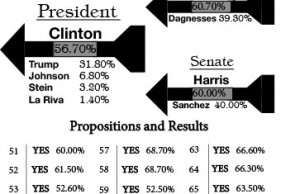Voices expressed in mock election
Amid the bombardment of television ads and mailed pamphlets, adult voters must take a position on Nov. 4 on issues ranging from healthcare to hunting. Even though a majority of students are not yet old enough to vote, roughly 700 students got the chance to take part in a mock election on Wednesday, Oct. 29.
23 social science classes led by nine teachers voted on six propositions, California governor, house representative and school board in the mock election. Parent and student volunteers tallied the votes afterwards: 54.7% re-elected Governor Jerry Brown, 50.6% voted Jeff Gorell to the House of Representatives, and all six propositions passed.
“(Students) need to learn how to vote, how to research the issue, how to research candidates, not just believe what they see on TV,” Rich Bradley, social science teacher and coordinator of the student election, said. “The decisions they make are going to be affecting themselves, their future kids, their grandparents, and they need to know their issues because their decisions are big.”
Before the process, Bradley advised students in his class to find more information about the legislation and candidates being considered. On election day, students voted in a separate booths by themselves, making decisions “alone in that booth with just your thoughts and your ballot,” as Bradley said.
Overall, student responses were “positive.” Senior Lauren Dziedzic said that the experience convinced her to register for a voter’s license when she turns 18 in February.
“Without our vote, democracy would not exist. The more people that can vote, the more options we have as America,” Dziedzic said. “Voting just means our freedom.”
Atis Petersons, Bradley’s former history teacher and an observer of the election, believes that the mock election is an important step to increasing voter turnout in the future.
“(Voting) is really important to becoming a good citizen, but unfortunately only one in four people vote today. People are apathetic, they don’t care about candidates, they think it’s a bother to drive, and some states make it difficult to vote,” Petersons said. “Some students think it is shocking that three out of four don’t vote (while) we are given the process.”
Through this process, students have experienced the intimidations of expressing their voice in the government.
“This mock election has taught me definitely to vote in every election, and definitely to vote, to research and know the facts,” Dziedzic said. “Throughout my future as an adult, it would just mean my freedom, and I would encourage everyone to vote.”

